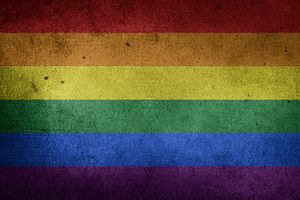Incheon’s first ever Queer Culture Festival was severely disrupted and delayed this weekend after protesters blocked the parade and verbally and physically harassed participants. Even though just a month ago Seoul hosted its largest ever pride event, the incident in Incheon is a reminder that anti-LGBT sentiment is still alive and well in South Korea.
On September 8, about 300 participants gathered to celebrate the first ever Queer Culture Festival in South Korea’s third largest city of Incheon. However, 1,000 anti-LGBT protesters halted the event, laying down on the street in order to block the event from proceeding. There were also reports of violence by protesters against festival participants. In the end, eight people were booked by Incheon Police for various charges of obstructing the gathering.
On September 10, festival organizers and allied groups held a press conference in front of the Incheon Metropolitan Police Agency in order to point out the police’s insufficient preparation for the event. “Last month, we received promises from Incheon police that they would block the opposition groups, but they didn’t protect us,” organizers said. “In the end, people were injured through clashes [with protesters].”
The festival garnered some controversy before it even started — the local district office where the event was to be held originally denied the group a permit, citing a lack of dedicated parking near the event space. Organizers called the decision unreasonable and arbitrary, noting that there were several public parking lots nearby. The group appealed the decision, and the Incheon city government planned to issue a ruling in October. But festival leaders decided to go ahead with the event on Saturday within “legal limits,” according to the Korea Times.
The incident in Incheon came just months after Seoul’s Queer Culture Festival celebrated its largest-ever gathering. According to organizers of that event, around 120,000 people participated in the festival, which ran from July 13 to July 22 this year. There were similar anti-LGBT protests at the Seoul event — in fact, a petition filed with the Blue House to cancel the event drew more than 200,000 signatures — but the festival and parade still went forward successfully.
This opposition reflects a general antipathy among the Korean public toward LGBT issues — although this has been changing in recent years, particularly among younger generations. According to polling from the Asan Institute, the number of respondents who say they have “no reservations about homosexuality” has increased from 15.8 percent in 2010 to 23.7 percent in 2014. Support for same-sex marriage also increased modestly in that time, from 16.9 percent in 2010 to 28.5 percent in 2014. But the poll also reveals a major generation gap — 47.7 percent of respondents in their 20s were tolerant of homosexuality versus just 7.1 percent of respondents in their 60s.
There are other signs of progress. Earlier this year, for example, a singer named Holland debuted as the K-pop industry’s first openly gay idol. He joins an extremely small list of out celebrities in South Korea. TV personality Hong Seok-cheon is the most well-known — when he came out in 2000, he was immediately fired from the children’s show he hosted, and received death threats. Now, he is a staple on Korean TV again, and does not shy away from talking about his identity and LGBT issues.
After the incident in Incheon this weekend, LGBT activists are concentrating on Busan’s upcoming festival, which will take place on October 6. According to the Kookje Shinmun, LGBT people and allies have been posting that after seeing what happened in Incheon, it is more important than ever to attend the upcoming Busan event.
Despite the negativity at this year’s event, organizers of the festival in Incheon are not deterred. “We’re sorry that through insufficient action we weren’t able to make a more joyful time,” they wrote on Twitter. “However, our will will never break, and we promise to hold an Incheon Queer Culture Festival that develops more and more next year, the year after that, and 100 years from now.”
Jenna Gibson is a doctoral candidate in political science at the University of Chicago and a Korea blogger for The Diplomat. You can find her on Twitter at @jennargibson.
































